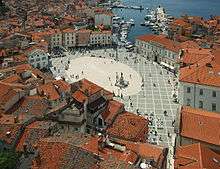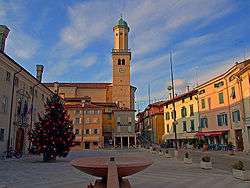Boris Podrecca
Boris Podrecca (born 30 January 1940 in Belgrade) is a Slovene-Italian architect and urban designer living in Vienna, Austria. Podrecca is considered by some critics a pioneer of postmodernism. With some of his early works, such as the neuro-physiological institute at Stahremberg Palace (1982), he took a new, more tolerant attitude towards historical architectural forms.

Biography
He was born in Belgrade, Serbia (then in Yugoslavia), to a Slovene father and a Serb mother. His father was a Slovene immigrant from the Italian border region known as Julian March (Venezia Giulia), who had fled to the Kingdom of Yugoslavia in order to escape persecution from the Italian Fascist regime. His original Slovene surname, Podreka, had been Italianized to Podrecca in the early 1930s. After World War II, the family moved to Trieste, Italy, where Boris attended a Slovene language elementary school.
In the 1960s, he moved to Vienna to study architecture at the University of Technology where he graduated in 1968 with Professor Roland Rainer. From 1979 to 1981 he worked as an assistant at Technical University of Munich and later, as a guest lecturer at Lausanne, Paris, Venice, Philadelphia, London, Harvard-Cambridge, Boston and Vienna. From 1988 until 2006 he was full professor at the Technical University of Stuttgart and Director of the Institute of Architectural Design and Theory of Space. He is a foreign member of the Serbian Academy of Sciences and Arts.
Boris Podrecca became famous with the exhibition of the work of the architect Carlo Scarpa in the church of Chiesa della Carita at the 1984 Venice Biennale and later the Villes d'Eaux exhibition in Paris. He was also responsible for the exhibition of the work of Jože Plečnik in the Pompidou Centre in Paris (1986). As a leading exhibition designer he set up the Biedermeier (Vienna, 1987), Bismarck, Prussia, Germany and Europe (Berlin, 1990) and One Hundred Years of Austria exhibitions (1996).[1]
Main works


- Tartini Square, Piran, Slovenia, 1987–89
- Piazza XXIV Maggio, Cormons, Italy, 1989–1990
- Dirmhirngasse School, Vienna, 1991–1994
- Museum of Modern Art, Ca' Pesaro, Venice, 1992–2002
- Greif-Areal mixed-use development, Bolzano, Italy, 1992–2000
- Judeca Nova Apartments, Giudecca, Venice, 1995–2003
- "In der Wiesen" Social Housing, Vienna, 1996–2000
- Millennium Tower, Handelskai, Vienna, 1997–1999
- Railway Square, Krems an der Donau, Austria, 1997
- Hotel and Conference Centre, Mons, Ljubljana, 2000–2004
- City Square, Motta di Livenza, Italy, 2001–2002
- Praterstern Urban Square, Vienna, 2002–2008
- VBio Center 1, Vienna, 2003–2005
- Skidome und Multi-Functional Center, Garching bei München, Germany, 2005
- Punta Skala Resort, Zadar, Croatia, 2005-
- Station San Pasquale, Napoli, Italy, 2006-
- Šumi Center, Ljubljana, Slovenia, 2006 -
- Science and Technology Museum, Belgrade, Serbia, 2007-
- Civic-Cultural Centre in Ajdovščina, Slovenia, 2010 -
- Grain Bridge, Ljubljana, 2010
- PP1 project (skyscraper and "city cottages"),[2][3] Padua, 2010 -
- Hotel Falkensteiner, Belgrade, Serbia, 2012[4]
Awards
- 1986: Ordre des Arts et des Lettres, Paris
- 1990: Kulturpreis für Architektur, Vienna
- 1992: Jože Plečnik Award, Ljubljana
- 1996: Honorary Member of the Federation of German Architects
- 2000: Honorary degree of the University of Maribor, Slovenia
- 2003: Liberty Award by the President of the Republic of Slovenia
References
- Boeckl, Matthias: Boris Podrecca. Public Spaces, Chronicle Books, 2003, ISBN 3-211-00513-7
- AA.VV., Boris Podrecca. Architettura e Poetica della diversità, Lezioni di Architettura e Design, vol 44, Corriere della Sera, Milan, Italy, 2016
- Boris Podrecca short bio Archived August 15, 2009, at the Wayback Machine
- "A new skyscraper for Padua". Archived from the original on 2011-08-20. Retrieved 2010-12-21.
- PP1 project Archived February 11, 2011, at the Wayback Machine
- http://www.beobuild.rs/read.php/579.html
| Wikimedia Commons has media related to Boris Podrecca. |